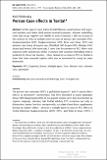Person-Case effects in Tseltal
Author(s)
Shklovsky, Kirill
DownloadShklovsky-2012-Person-Case effects.pdf (1.070Mb)
PUBLISHER_POLICY
Publisher Policy
Article is made available in accordance with the publisher's policy and may be subject to US copyright law. Please refer to the publisher's site for terms of use.
Terms of use
Metadata
Show full item recordAbstract
In this paper I show that in Tseltal (Mayan), constructions with aspectual auxiliary only admit third-person internal arguments, whereas embedding verbs that assign ergative case exhibit no such restriction. I offer an account of this contrast in terms of multiple-agree account of person-case constraint (PCC, Anagnostopoulou 2003; Anagnostopoulou 2005; Béjar and Rezac 2003) and inherent case theory of ergative case (Woolford 1997; Legate 2008; Aldridge 2007; Anand and Nevins 2006 inter alia). I show that the presence of PCC effects with aspectual verbs and absence of this restriction with transitive embedding verbs is predicted by these two theories. I then extend my account of PCC in Tseltal to show that some nominal ergative splits can be accounted for using the same framework.
Date issued
2012-08Department
Massachusetts Institute of Technology. Department of Linguistics and PhilosophyJournal
Linguistic Review
Publisher
Walter de Gruyter
Citation
Shklovsky, Kirill. “Person-Case Effects in Tseltal.” The Linguistic Review 29.3 (2012): n. pag. © 2012 by Walter de Gruyter
Version: Final published version
ISSN
0167-6318
1613-3676